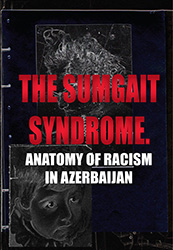Military expenditure of Azerbaijan compared with Armenia (1992-2015)


October 26, 2015
The Honorable James Warlick
U.S. Co-Chair
OSCE Minsk Group
Dear Ambassador Warlick:
We are writing out of concern over the escalation of violence in Nagorno-Karabakh, resulting in deaths on both sides of the conflict. It is our hope that the United States, through its role in the Organization for Security and Cooperation in Europe’s (OSCE) Minsk Group, as well as through direct diplomacy with both Armenia and Azerbaijan, will immediately advocate for several steps to promote peace in the region.
read more
MIA Publishers, Fifth Edition, Moscow 2015
By Shahen Avakian
The study covers the legal aspects of Nagorno Karabagh problem. It examines the issues of Law as they affected the legal status of Nagorno Karabagh.
The author is an expert of International Law. He has graduated from the Paris Sorbonne University and is specialized in International Public Law and International Organizations law.
read more
MIA Publishers, 2013
By NGO “Against Xenophobia and Violence”
This book briefly reveals the history of Artsakh since the ancient times until the present days. Here you can find both cultural and political aspects of Artsakh’s history.
FILES:

MIA Publishers, 2013
By Ioannis Charalampidis
This research is based on original testimonies, articles of reliable journals and newspapers and research of authoritative experts in the field. I would like to extend my gratitude to the Government of the Republic of Nagorno-Karabakh for providing copies of previously classified documents seized from the battlefield, which are published for the first time here.
Ioannis Charalampidis
Brussels, December 2012

MIA Publishers, 2012
By NGO “Against Xenophobia and Violence”
Sumgait is 26 kilometres from Azerbaijan’s capital, Baku, and was home to some 18,000 Armenians in 1988. On 26 and 27 February 1988, demonstrations were organised in Sumgait under the slogan
“Death to Armenians!” What took place on the streets of Azerbaijan during the following three days has been referred to ever since with the horrific name of “Sumgait”.
The massacre of Armenians in Sumgait, February 27–29, were merely a continuation of the Azerbaijani authorities’ unswerving policy of racism towards Armenians and ethnic cleansing of the Armenian population, with unpunished killings and deportations.
By Radio Free Europe / Radio Liberty
WASHINGTON — The United States is “not satisfied” with explanations from Baku and Budapest concerning the case of an Azerbaijani officer who brutally murdered an Armenian soldier at a NATO seminar in Hungary eight years ago.
Philip Gordon, the U.S. Assistant Secretary of State for European and Eurasian Affairs, told RFE/RL at the Center for European Policy Analysis’ U.S.-Central Europe Strategy Forum on September 20 that Washington continues to express “dismay and disappointment” to Budapest about its decision to release Ramil Safarov to Baku.
read moreP7_TA-PROV(2012)0356
Azerbaijan: the case of Ramil Safarov
European Parliament resolution of 13 September 2012 on Azerbaijan: the Ramil Safarov case (2012/2785(RSP))
The European Parliament ,
– having regard to its previous resolutions on the situation in Azerbaijan, in particular those concerning human rights,
– having regard to the established practice of international law regarding transfer, namely the Convention on the Transfer of Sentenced Persons, under which it was agreed that cooperation should be developed in order to further the ends of justice and the social rehabilitation of sentenced persons, by giving them the opportunity to serve their sentences within their own society,
read moreSpokesperson for the UN High Commissioner for Human Rights: Rupert Colville
We are seriously concerned about the case of Ramil Safarov, an Azerbaijani military officer who was sentenced to life in prison in Hungary for the brutal 2004 murder of an Armenian officer, Gurgen Markaryan, who was taking part in the same NATO training programme in Hungary. The murder was clearly ethnically motivated.
read moreHIGHLIGHTS OF THE NOON BRIEFING BY MARTIN NESIRKY, SPOKESPERSON FOR SECRETARY-GENERAL BAN KI-MOON